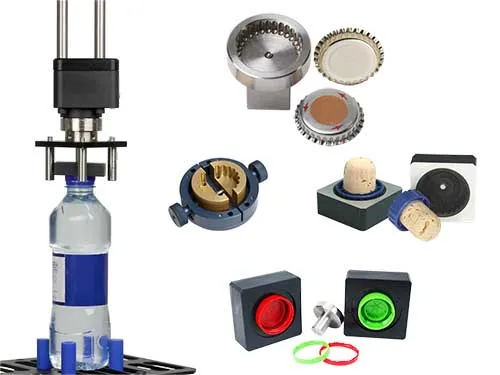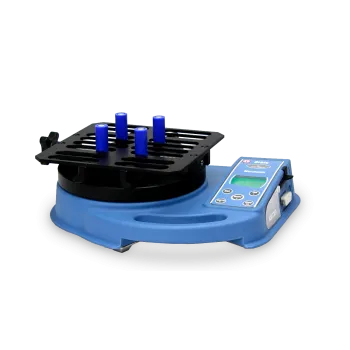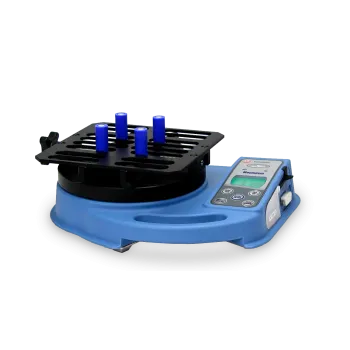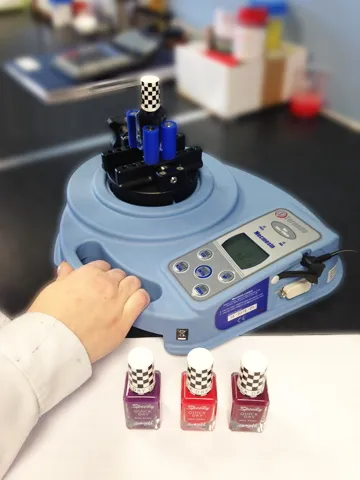Bottle cap torque testing with custom mandrels


Solution
- Software-controlled torque tester and software
- Custom-designed mandrels matched to the closure geometry and material
- Peg Drive to rotate the specimen and allow free vertical movement
Benefits
- Appropriate gripping of bottle caps greatly improves torque measurement accuracy
- Motor-driven torque testers and mandrels deliver the ultimate in repeatability
- Software enables salient events to be recognised in complex, CRC and TE designs
Requirement
A key element, when measuring the opening and closing torque characteristics between a bottle and its cap, is to minimise any distortion of the closure by gripping evenly and uniformly. A mandrel, custom-made to match the cap design, is the best way to ensure correct gripping when testing. Using the mandrel on test equipment, which applies torque at a constant speed of rotation, will enable optimum repeatability.
Any test process has the objectives of accuracy, repeatability and reproducibility. When measuring the torque of bottle closures, particularly plastic ones, there are several factors which influence the achievement of these objectives - most notably the way the closure is held.
Gripping the closure uniformly around its complete circumference without distorting it significantly, is critical to producing repeatable test results.
If the closure is held at just two or four points, as with human fingers or within a standard peg fixture, it introduces ‘pinch points’. This distorts the closure with the risk of greatly affecting test repeatability.
A custom-made mandrel fits snugly to the closure and grips uniformly around the complete circumference without distortion. The closure/mandrel is then driven against a fixture attached to the torque sensor, which records the opening and closing torque. Methods for testing the characteristics of opening (removal), closing (application), slip, bridge and reverse-ratchet torque all benefit greatly from the improved repeatability by using a cap mandrel.
Solution
Mecmesin manufactures closure mandrels to suit our customer’s needs, in two fundamental design:
- Single-form mandrels; machined specifically as an exact fit to match the profile of a single closure type.
- Split mandrels; comprising 2 mandrel halves, machined to suit a narrow span of individual closure diameters and profiles.
Single-form mandrels are preferred where there is a significant knurl on the external gripping surface of a closure. Mecmesin ensure the knurled profile is matched and produce the mandrel by either moulding directly from a typical closure, or 3D-printing from a design drawing.
For smooth closures with no significant knurl, a split mandrel design with rubber faces is used. This provides the friction to hold the closure during most torque tests.
In applications using metal closures (e.g. a crown cap, which features a fluted design), the mandrel is machined from stainless steel where durability is a key factor. For ROPP (Roll-on pilfer-proof) Stelvin® solutions, where the closure is formed around the thread of the bottle, it is important not to grip on this threaded area. We therefore supply a 2-part mandrel that firmly grips the solid top portion of the metal closure without causing distortion.
Child-resistant closures (CRC) requiring an initial top-load followed by a twisting motion can be measured using pneumatically operated mandrels to semi-automate the test.
For optimum repeatability it is recommended to use a torque tester with a constant speed motor–drive. With such a system, the mandrel/closure itself is rotated against a ‘Mandrel Peg Drive fixture’, which also allows the free vertical displacement of the closure, without affecting the torque measurement. For a torque tester, where torque is applied by hand, the use of a mandrel prevents clamping distortion helping to reduce some of the errors inherent in manual torque testing, and with less strain on the operator.
Test equipment
- Vortex or Helixa motorised torque tester with appropriately rated torque sensor.
- EmperorTM fully programmable torque testing software
- Custom-designed and mandrels matched to the closure’s specific design geometry, and material.
- Mandrel peg drive.




























